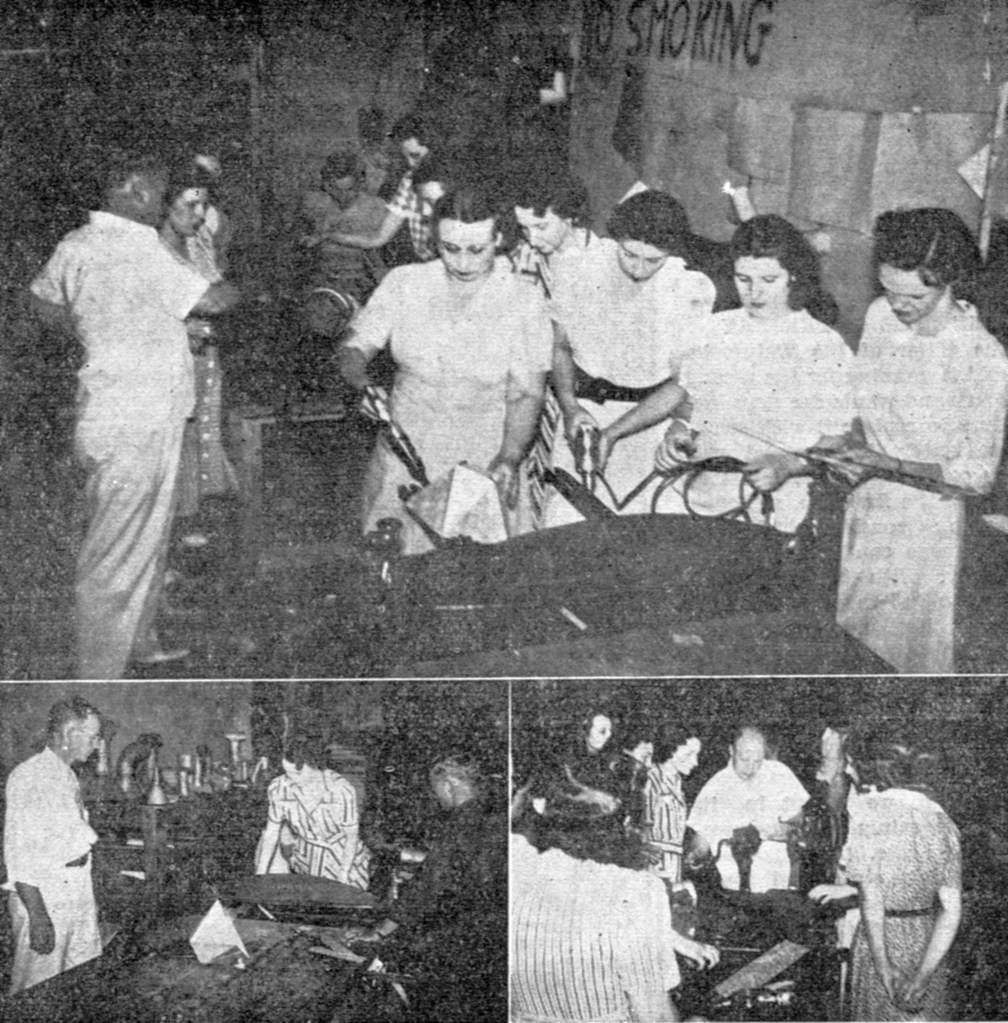WOMEN’S HISTORY MONTH: Athens women held real-life Rosie the Riveter roles
Published 3:00 am Thursday, March 26, 2020

- From the Limestone Democrat, July 2, 1942: “A. M. Jackson, supervisor of defense training at Athens High, is shown with Miss Jerene Turner (at the squaring machine) and Carlos Romine in the lower left panel. Getting a preview of some of their instruction to come, members of the class watch instructor Turner crimp a piece of metal (lower right) at a machine in the well-equipped shop at the school.
Editor’s Note: In honor of Women’s History Month, The News Courier and Limestone County Archives are celebrating some of Limestone County’s many impactful and history-making women. Each Thursday in March, The News Courier will publish the story of one of these incredible people, and readers can learn more about women’s history in Limestone County by contacting the Limestone County Archives.
Trending
A few years back, I was looking through the Friends of the Archives book “Limestone County During World War II,” when a name under a photo in the Limestone Democrat caught my eye: Jerene Turner.
I barely remember “Aunt Jerene,” who died when I was little, but I do remember my parents talking about her. The woman, who was the sister of my great-grandmother Elizabeth Turner Gresham and the granddaughter of L.C. and Sarah McCulley, operators of McCulley Mill in East Limestone, was tough as nails.
After reading through the article, I started to understand why. Titled “Athens women prepare to do war work,” the article, which was published July 2, 1942, started, “Although the measuring cup and frying pan may occupy their hands during the daytime, a number of Athens women discard them when seven o’clock rolls around each evening and tie themselves to a class in sheet metal work which, in a few weeks, will enable them to make repairs to fighting planes or help turn out bombers that will lay waste to Tokyo.”
The article ran with a photo collage showing women in dresses working on sheet metal. It said the first class in aircraft sheet metal work for women had begun at Athens High School that week and would meet three hours a night for five nights a week. Holmes A. Turner taught the class, and inaugural members were Mary Frances Barksdale, Goldie Cole, Ruth Kerr, Frances Duren, Sue McSherry, Jerene Turner, Doris Morris, Madeline Stovall, Ruthie Adams, Gervis Maye McLemore, Doris Black and “Mrs. Smith.”
“The course, sponsored by the State Dept. of Education under auspices of the City Board of Education, is designed to fit women for maintenance and repair work at airfields and production jobs in factories, thus freeing men for duty in more active war areas,” The Democrat said. “They will receive training with industry-type equipment in sheet metal work, riveting, welding, and spray-gun painting.”
Aunt Jerene went on to become the first “Rosie the Riveter” from Athens to go out into the field. An article from October 1942 says, “Miss Turner completed the course in Sept., leaving at once for Memphis where she is employed under the civil service on defense work.”
Trending
But Jerene Turner was far from the only one of the Athens riveters to serve her country.
Sue McSherry joined the Women’s Army Corps and served throughout the war, being stationed at West Palm Beach, Florida, when she was released in December 1945. In 1947, Sue and her husband, Louie Alvarez, also a veteran, had their first son, Louie Jr., at Powers Hospital in Athens.
In December 1942, the Limestone Democrat reported another one of the riveters had found work. Doris Morris, daughter of Mr. and Mrs. T.C. Morris, had been in Washington, D.C., since that August, working as a junior clerk in the War Department.
Aunt Jerene went on to work at Brookley Field in Mobile, and in September 1943, the Limestone Democrat noted she was working there as a junior aircraft mechanic when she came back home to Athens for a week to visit her mother, Tera Turner, and her sister Ruth.
Also in September 1943, Gervis Maye McLemore married William S. Owens of Athens. On New Year’s Eve 1943, another one of the riveters married a soldier: Madeline Stovall, carrying orchids and wearing a powder blue suit with navy accessories, walked down the aisle to marry Sgt. John H. Roper. The Democrat reported Stovall had been employed at Redstone Arsenal before marrying Roper, a native of Ardmore, Tennessee, who was stationed in Leesburg, Florida. The newlyweds would make their home in Leesburg.
Two of the women went on to be successful in business. In January 1944, the Alabama Courier reported Goldie Cole was newly in charge of the College Inn Café on North Clinton Street, after Floyd Blair sold it to the Cole brothers. Throughout the late 1940s, Frances Duren was often mentioned in the papers for her work with the Women’s Business Circle of the Baptist church.
Doris Black had a successful career as well. On the July 4, 1946, the Alabama Courier reported she had recently been transferred from Turner Field in Albany, Georgia, to Boca Raton, Florida.
After the war, Jerene Turner went to Montgomery, where she was appointed to the position of clerk in the Department of Industrial Relations. She later married F.A. Hill in Montgomery and eventually retired. But I never knew about her “Rosie” past until I discovered her story in the Limestone County Archives.
It was a discovery I was proud to make.





